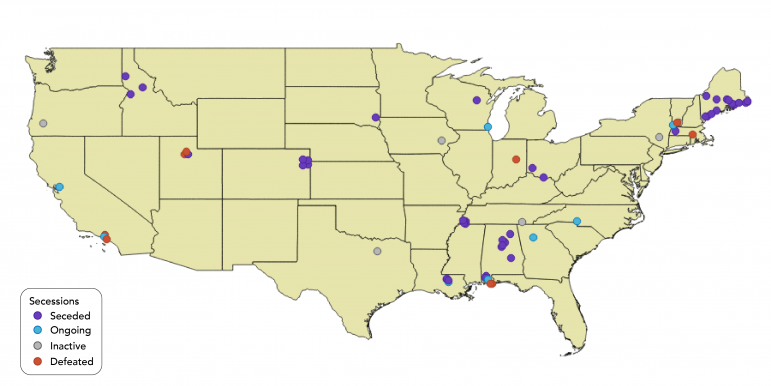New National Report Critical of School Secession in Alabama
A report out Wednesday says Alabama is at the forefront of a trend: school systems breaking away to form separate districts. According to the report from the national advocacy group EdBuild, almost a quarter of the nation’s school district breakaways since 2000 have happened in Alabama. Lead author Rebecca Sibilia tells WBHM’s Dan Carsen the work started with a nationwide survey of school secession laws.
Why it’s Happening, and Why EdBuild Calls it “Alarming”
“What we found was startling in that most states do not require any consideration of what’s happening with the children that are being left behind … Our school funding system is creating gulfs. The students who are being left behind tend to be left behind in impoverished, denser, poorer districts. [And] whenever you’re breaking apart a larger, logically functioning municipality, you end up in a place where you start duplicating and tripling the costs associated with providing education, and frankly, just further burdening the taxpayers in order to create this notion of local control … Communities are being provided the incentive to break away from larger municipalities because they get to keep their wealth. You can’t blame communities for trying to do so — they’re always going to want to provide for their kids. This is a school-funding system and a set of laws that are providing the incentive and allowing that to occur.”
Race, but Not Just Race
“We don’t want to necessarily say that this is race-motivated, certainly not in all cases, but we do believe it’s socioeconomically motivated, and unfortunately that’s also linked to race in our country.”
And in Gardendale?
“The judge did find that there were some racially segregating motives behind the Gardendale effort. One of the things that was striking to us, though, is that the City of Gardendale was saying, ‘Look there are so many other neighborhoods that have seceded under this existing desegregation order. Why can’t we?”
Solutions
“The real and ultimate solution here is to reduce the incentive to [secede] by changing the way we’re funding schools, and to go back to the Supreme Court and argue that school district borders should not be the means by which we can continue to segregate our children.”
To see the EdBuild report, click here. To hear an extended conversation with lead author Rebecca Sibilia, click below:

Ilia Malinin, figure skater favored for gold, finishes 8th
Malinin, undefeated since 2023, stumbled and fell multiple times, landing far off the podium. Mikhail Shaidorov of Kazakhstan won gold in an upset that shocked even himself.
DHS says immigration agents appear to have lied about shooting in Minnesota
Julio Cesar Sosa-Celis was shot in the leg during the incident. Another Venezuelan man was also accused of attacking an immigration officer.
FBI releases description of suspect, increases reward in Nancy Guthrie case
The FBI describes the armed man caught on Nancy Guthrie's camera as 5-foot-9-inches to 5-foot-10 and of average build. The 84-year-old mother of Savannah Guthrie has been missing since Feb. 1.
Virginia court allows Democrats’ redistricting vote in their plan to counter to Trump
The ruling allows an April election where voters can let the legislature draw a new congressional map. It could help Democrats win more House seats. Republicans might still fight it in court.
A familiar move with a new twist: Trump tries to cut CDC funds he just signed into law
A federal judge in Illinois quickly issued a restraining order after the Trump administration slashed more than $600 million in CDC grants to four blue states.
Kitty cats and cloud hands – how U.S. Olympic snowboarders keep calm in competition
U.S. snowboarders psych themselves up before competition with heavy metal and pop music, cat photos, and apparently many on the men's halfpipe team now do Qigong.






